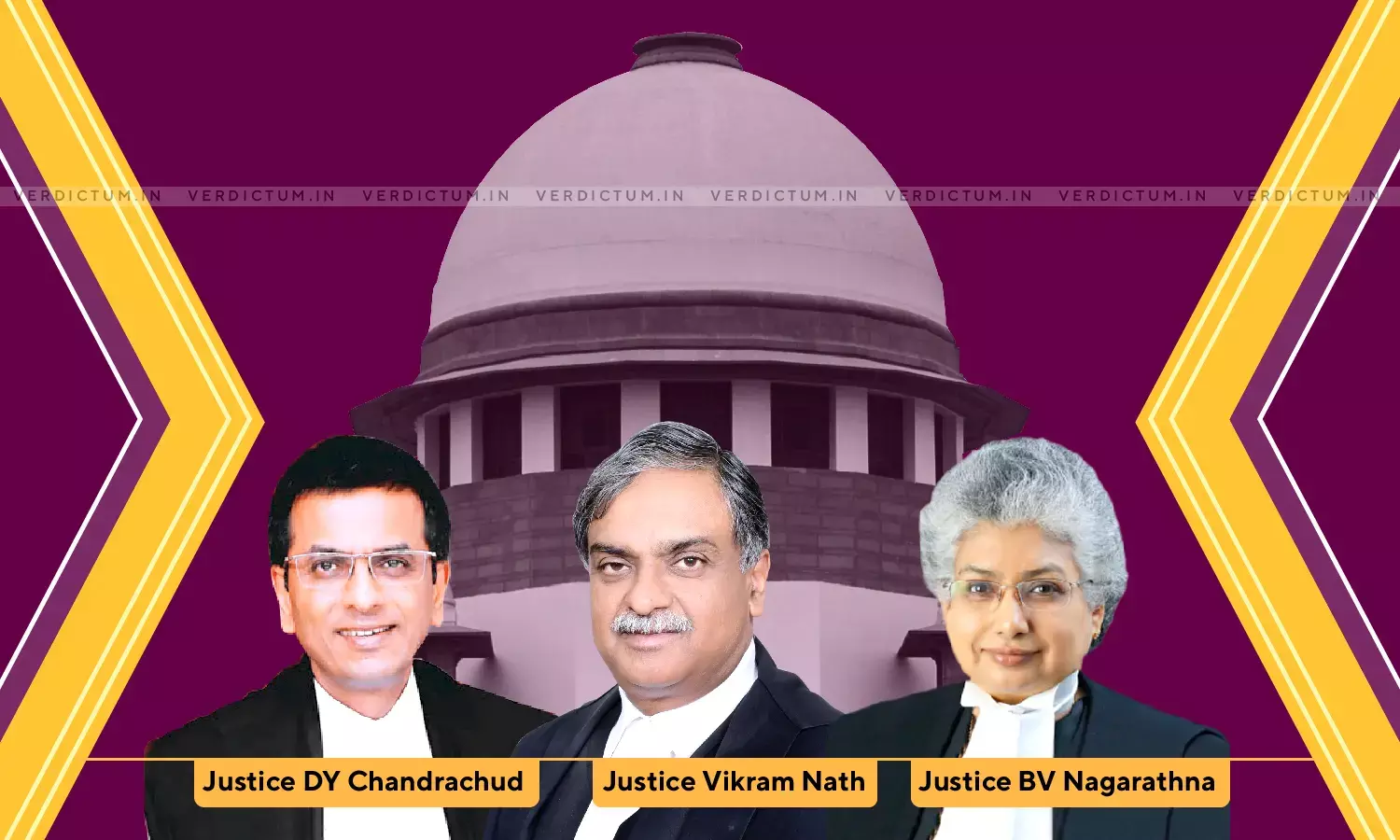Culpability Of An Accused Cannot Be Decided Based On Evidence Not Recorded In His Or His Pleader's Presence: Supreme Court

A three-judge Bench of Justice Dr. DY Chandrachud, Justice Vikram Nath, and Justice BV Nagarathna has held the culpability of any accused cannot be decided on the basis of any evidence, which was not recorded in his presence or his pleader's presence and for which he did not get an opportunity of cross-examination, unless the case falls under exceptions of law. The Court held that the exception to the principle finds a place in Section 205 of Cr.P.C. wherein personal attendance of accused is dispensed with and he is permitted to appear by his pleader and also in Section 299 of Cr.P.C., which provides for recording of evidence in the absence of the accused under certain eventualities like absconding of accused or commission of an offence punishable with death or imprisonment for life by some person or persons unknown.
The Court also held that the evidence recorded in a criminal trial against any accused is confined to the culpability of that accused only and it does not have any bearing upon a co-accused, who has been tried on the basis of evidence recorded in a separate trial, though for the commission of the same offence.
Appeals were preferred by the six accused before the Supreme Court assailing the order of the Single Judge of Madras High Court which had reversed the findings of the Trial Court and had convicted the Appellants under Sections 132, 135(1) (a) (ii) read with 135A of the Customs Act 1962. The Appellants were sentenced to undergo imprisonment of one year and a fine of Rs. 50,000 each and in default to undergo six months rigorous imprisonment.
In this case, the Appellants were accused of smuggling Sandalwood billet/sticks and Mangalore Tiles to Singapore without the payment of Customs Duty. A raid was conducted by the Anti-Smuggling wing of the Customs department at Tuticorin and large quantities of cardboard boxes were recovered out of which 419 boxes had sandalwood sticks and 57 boxes had Mangalore tiles.
The Trial Court had acquitted all the six accused via two separate judgments and gave the relevant findings for the acquittal. The High Court had convicted all the six accused through a common judgment in both the appeals filed.
The Appellant contended before the Court that both the appeals arose of two separate trials and two separate judgments but the High Court considered the evidence of only one case and passed one common judgment so as to record conviction of all the six accused in both the appeals. It was further argued that this was not only contrary to settled principles of criminal jurisprudence as also, criminal justice delivery system but also contrary to the statutory provisions of CrPC and Indian Evidence Act.
While the Respondent contended that no serious error could be alleged by the Appellants as the evidence in both the cases was identical. No prejudice was caused to the Appellants as the evidence was the same in both the trials.
The issue which was dealt with by the Court was whether the evidence recorded in a separate trial of co-accused could be read and considered by the appellate court in a criminal appeal arising out of another separate trial conducted against another accused, though for the commission of the same offence.
The Apex Court observed that in order to consider and dissect the issue it was relevant to bear in mind that fair trial is the foundation of the criminal justice delivery system and there are certain guiding principles to ensure a fair trial against the accused.
The Court referred to the relevant provisions of CrPC and certain precedents and held that the High Court committed an error of law in dealing with the evidence of one trial for deciding both the appeals arising out of two separate trials.
Further, the Bench opined, "Merely because the seven witnesses produced by the prosecution were the same in both the cases would not mean that the evidence was identical and similar because in the oral testimony, not only the examination-in-chief but also the cross examination is equally important and relevant, if not more."
"The role of each accused cannot be said to be the same. The same witnesses could have deposed differently in different trials against different accused differently depending upon the complicity or/and culpability of such accused," the Court noted.
The Court additionally asserted, "The culpability of any accused cannot be decided on the basis of any evidence, which was not recorded in his presence or his pleader's presence and for which he did not get an opportunity of cross-examination, unless the case falls under exceptions of law."
The Bench also addressed the issue of whether to remand one case to the High Court for fresh decision i.e. the case in which the evidence was not considered and to proceed with the other case in the Supreme Court.
Concerning this, the Court observed, that it would be in the best interests of justice to remand both the matters back to the High Court for fresh decision.
In the light of the aforementioned observations, the Court set aside the impugned judgment of the High Court in both the appeals and remanded the matters back to the High Court for fresh disposal in accordance with law.

